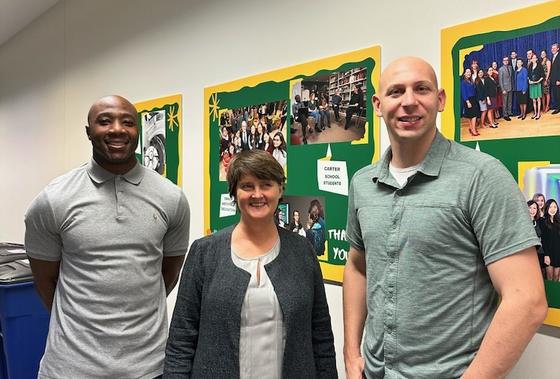Neither Paul Deller nor Michael Harris knew anything about George Mason University before they enrolled in the Master of Public Policy (MPP) program in the Schar School of Policy and Government.
Now, both are Mason boosters.

“Exceptional,” Deller said when asked about his experience at the university. “There are a number of people who teach at Mason who I have heard on some of my favorite podcasts and read about in the news for years. I’m still amazed that I get to learn at an institution where you regularly bump into these people in the hall.”
“Outstanding,” Harris said. “The faculty, staff, and students I’ve met so far have all been amazing.”
Deller and Harris are part of an interesting cohort of 11 Marine Corps officers attending Mason through the Congressional Fellowship Program, which gives Marines opportunities for professional development that include working on Capitol Hill in the office of a member of Congress for one year and enrollment in Mason’s graduate public policy program.
It is another example of Mason identifying educational pathways that meet students where they are, while the university engages them, in this case, on the Mason Square Campus in Arlington, Virginia, which is just six miles from downtown Washington, D.C.
It also is an example of Mason’s commitment to active-duty military, veterans, and their families. With 1,790 Mason students holding veteran certification, the university is ranked as the nation’s No. 1 military-friendly institution by College Factual.
“Mason is unique from other universities I’ve attended or graduated from,” said Maj. TJ Byers, who manages the Congressional Fellowship program and graduated from Mason with an MPP in May 2022. “The professors set us up for success. I even reached back out to them during my year on Capitol Hill to get some technical assistance for some policy stuff I was working on, or with just a generalized question in a field I needed to research.”
For Deller, 35, a major, and Harris, 33, a captain, in the Marines’ Office of Legislative Affairs at the Pentagon, the master’s degree they will receive at the end of the program will prepare them for their year on Capitol Hill and enhance their career prospects in the Marine Corps.
“I’ve always been interested in pursuing a master’s degree,” Harris said. “My undergraduate degree is in economics and the MPP program has an economic policy focus area, so it aligns with my interests. The program will assist in my ability to be an effective liaison between Congress and the Marine Corps. And learning to be a more effective team leader will pay dividends in the future.”
Anne Holton, professor of public policy and education at Mason, has both Marines in her Public Sector Leadership class.
She called Deller “outspoken and chatty” and Harris “quiet and thoughtful.” And though Harris doesn’t speak as often, “when he does, it’s powerful.”
Both of them, Holton added, are “great contributors to the class.”
“The military presence is our classes is significant,” Holton said. “It’s exciting that these folks are taking seriously what it means to be leaders and future leaders.”
And, really, that is what the Congressional Fellowship Program and the MPP program are all about.
“The ultimate purpose is to bring back this knowledge to the Marine Corps and share it with others,” Deller said. “The program isn’t about what I get to take away from it, it’s about how this experience will allow me to contribute to the development of the Marines throughout the remainder of my career.”
